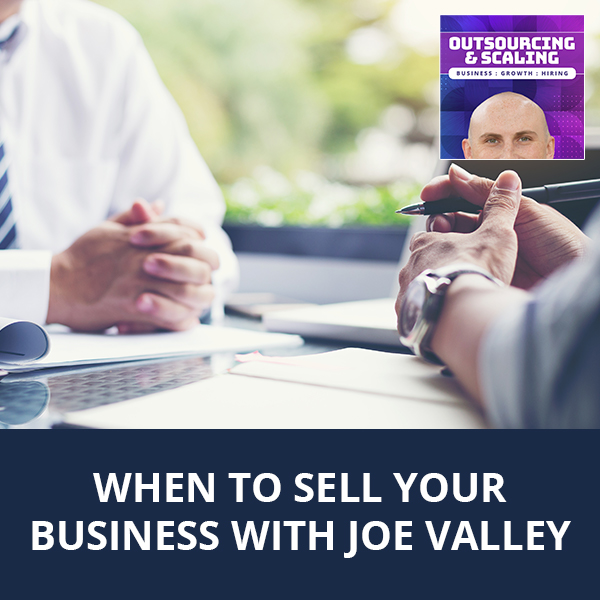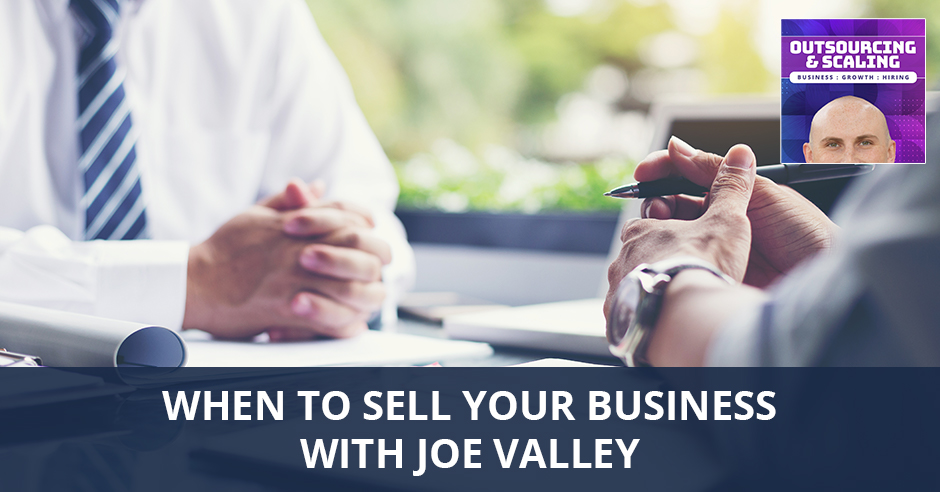


There’s a right time to sell a business, and the right time is when you’re ready. The problem is that many people don’t plan to ever be ready. They love it, it’s their baby, and they never want to sell it – until they wake up one day tired, bored, or wanting to start on a new opportunity. On today’s show, Joe Valley, an equity partner at Quiet Light, joins host Nathan Hirsch to talk about the right time to sell a business and planning your exit strategy to make your business more sellable. Find out how you can add value to your business so you can earn more when the time comes to let it go.
—
Listen to the podcast here:
[smart_track_player url=”https://www.podetize.com/statsapi/www.podetize.com/wp-content/uploads/fileuploads/11-5b145ef137b51b3d1af0633e9305c43d/09/2019/1b4664257e0769809045b754d06cb1a1.mp3″ title=”When To Sell Your Business with Joe Valley” artist=”Nathan Hirsch” image=”https://freeup.net/wp-content/uploads/2019/04/OAS.png” ]
Download the audio file here.
When To Sell Your Business with Joe Valley
My guest is Joe Valley from Quiet Light. Joe, how are you doing?
I’m doing great. How about you?
I’m doing great. For those of you that don’t know, Joe is an Equity Partner at the Quiet Light, a business brokerage firm specializing and selling online businesses. We refer a lot of businesses to them when they’re looking to sell. Joining after selling his own eCommerce business through the same brokerage in 2010, Joe has personally closed over $65 million in transactions and is now the director of broker services. Joe, that is quite impressive. I want to talk all about that, but let’s take a gigantic step back. Before your eCommerce business, before Quiet Light, what were you doing? Were you a rebel or a straight-A student? Where you trying to get a real job? Did you always know you wanted to be an entrepreneur?
I have to say I was a straight–A student because my son is a rising senior. We’re trying to get him to do better and remain a straight-A student. I lied to him and told him I was a straight–A student. He knows I was definitely a B student. I’ve been self–employed for many years. The first company I started as an adult, not kind in college, which I did that too. As an adult, first company I started was a radio direct response media buying agency back in 1997 to skillset I had from a company I worked for. I left, had a certain financial goal to reach in my first year and I ten–timed that goal. I loved self-employment, said I‘d never go back and I haven’t. I ended up about a year into that, developed a product, started a product marketing company. We launched our first product on radio in 1999.
I took it to a TV infomercial as well. Did the second one radio, took it to a TV infomercial, eventually took it 100% online in 2005. For a few years it was me and a small outsource staff, 100% online eCommerce business. I took it through the best of and the worst of the economy and woke up one day and said, “I’m done. I’m tired. I have a great gig. I work from home. I make good money, but I don’t want to do it anymore.” I did some research and found three brokerage firms. There weren’t many back then and specialized in online businesses like now. I reached out to all three. Two of them felt like they just wanted to get their hooks into me for a commission.
The third was a guy named Mark Daoust of Quiet Light. He gave me some advice that was in my best interest and I thought, “I love this guy. This is great advice.” I waited a few months, took his advice, understood the valuation process which is the most important thing, understanding what the value of what is very likely your greatest asset is. I waited few months, listed in late August, early September and we closed the transaction in November, 2010. I went back to media buying. I bought a content site and then I joined the Quiet Light team several months later. I’m a partner here. It’s a great opportunity. I love working with other entrepreneurs.
You don’t want to sell your business too early or sell it too late.
Can you share some of that advice that they gave you?
In that situation, I took it through the best and the worst of the economy. The worst part was coming out of the worst part. The valuations of businesses are done on a minute level, on the trailing several months. The advice was, “Joe, things are getting better. If you look at months nine to twelve, they’re not as good as the next few months are going to be.” Let’s say that profit then was maybe $10,000 a month, whereas things are getting so much better. Maybe it’s going to be $12,500 a month. In a few months, I’ve added $10,000 in discretionary earnings and if I’m getting three–time multiple adds $30,000 to the value of my business. That’s the honest, helpful detail that Mark gave me at the time. It goes a lot deeper now.
It goes to outsourcing. It goes to renegotiating the cost of goods sold. It goes to streamlining, inbound shipping, and making sure you’re ordering inventory on time so you’re not paying air freight and you’re doing see and all of these things. It’s so important. Much can be saved in those things where if you’re getting a three–time multiple for your discretionary earnings and you add $40,000 in discretionary earnings for that. You’ve added $120,000 to the value your business without selling anything else, without taking any more risk. That’s the advice that Mark gave me at that time and it’s what I think is missing in so many valuation calls with so many folks.
When is the right time to sell your business? I think this is what a lot of business owners struggle with their business is their baby, but they don’t want to sell it too early. They don’t want to sell it too late. How do you go about evaluating if you should sell the business from a business standpoint, but also maybe a personal standpoint as well?
It could be that there’s never a right time to sell the business. The right time might be when you’re ready. The problem is that people don’t plan ever to be ready. They don’t plan to sell their business. They say, “I love it. This is my baby. I’m never going to sell it,” but they’re going to wake up someday and they’re going to say, “I’m tired. I want to sell. I’m an entrepreneur, I’m bored. I want to move on. I hate my business partner. I’m getting a divorce. I started this other opportunity. This old one is not as good. I love this new one. It’s more exciting. I want to sell.”
At that point, when you do what I do, which is decide to sell, you don’t plan well in advance. You’re not going to be prepared. You’re not going to make as much money. It’s not going to be as valuable and you work hard for it. The odds are incredibly high that as an entrepreneur, especially with physical products, eCommerce business, odds are very high that you’re going to make the most money when you exit. If you’re growing like crazy, you’re taking all of the cashflows and putting it right back in inventory trying to keep up in many cases. You’re not taking a ton of money out of the business because it’s going right back in inventory, paying for taxes and timing Chinese New Year and timing fourth quarter and all that stuff.

The biggest cash event for many people is on the exit. I see it time and time again, a younger business or even a business that’s four or five years old. I sold one, a very well-known podcaster like yourself. His name is Michael Jackness. His business is called ColorIt and it’s public information. We did a series of podcasts on it and he never was going to sell or he was going to bundle up four different brands to exit and he outsourced a lot of things, which is really smart. He planned a number of things in advance, but he had four brands in one seller account and two of the brands were not sellable. It turns out three out of the four were not sellable. Two weren’t worth anything because he had just launched them the year before and he wasn’t profitable yet.
The third couldn’t sell it because part of it was not transferable. We worked on that. The fourth is ColorIt. We went through that entire process. There are things in that process that if he had planned further in advance, he probably would’ve made 50% to 100% more money, but he woke up, was tired, emotional. He knew what to do and he said, “I’ll get to it someday.” He woke up and that Sunday was there. You just don’t have the emotional fortitude to stick it out in another several months. That’s the struggle and the challenge without planning in advance. The time when to plan, it’s really more of when do you do the planning and the plan. You do that now even if you never plan to sell. People probably know the value of their car, the value of their house, the value of their retirement account, but their most valuable asset is probably their business and they spend the most time with it.
The reality is they don’t know what the value of it is. I headed down to Charlotte for a meetup with a group called eCommerce Fuel. Hanging out, having some beers and someone asked me a general question and it was along the lines of what I said. Most people don’t know the value of the business. The guy sitting next to me says, “How do you figure that out? Do you hire somebody? Do you pay somebody? How do you figure that out?” It‘s amazing that I had been sitting next to him for an hour and he still had no idea what I do. People in my position do valuations for the purpose of building relationships. There’s no cost to it. There’s no commitment to it and it’s foolish to be afraid of it which many people are. They should know the value of the business otherwise they’re making a huge mistake. It’s not just a $10,000 mistake. It’s a $100 million, $200 million, $500,000, $1 million mistake if they’ve got a sizeable business that they may wake up and decide to sell down the road. They should be planning now, even if they never sell. They want to pass it onto their kids. They still should know the value of what they’re passing it on.
You were talking about Mike Jackness. He was a guest on and isn’t free a partner, but he was like guest one of our other episodes. If you’re reading, you can check out that episode. Mike is all about outsourcing. Let’s talk about that for a little bit. What do buyers look for when it comes to a team or the actual operations running with outdoor staff or office staff get? Can you go through that a little bit?
It’s one of the four pillars that we focus on. They are risk, growth, transferability and documentation. It’s that outsourcing, that transferability part that’s important. Having an outsourced team is ideal because if you’ve got someone that lives and works in Boise, Idaho, odds are if you’re an internet-based entrepreneur, but you have a local staff of ten. That makes the business harder to transfer to someone that wants to or lives in Atlanta, Georgia. That decreases the value of the business because it’s not as transferrable. It’s probably also costing you a lot more. I had a business that I sold a couple of years ago. We were going into Q4 2017 and I’m doing the valuation for him. Great guy, really nice guy, a good human like Mike Jackness and he’s paying his brother something like $20 an hour to do customer service work with a guaranteed twenty hours a week.
Commingling is the death of value.
He’s paying his brother $400 a week to do customer service a week or $20,000 a year. When we drilled down to it, his brother was only working about five hours a week. Most of the work he has done was responding with an autoresponder choosing the answer. That can be outsourced through someone like you very inexpensively. Even if you wanted a US person to do it, it’s still not going to require twenty hours a week. That planning in advance, my advice was, “I know Christmas was coming, but you should fire your brother.” A nice guy, he didn’t do that, but we were able to make an adjustment in the P&L and the add back schedule with logic and math go luck. He’s grossly overpaying his brother for time and hours and money.
We made an adjustment as if we were working with someone like yourself to outsource it and get a calculation, did some examples. I might even call you when it gets some value, expectations in terms of costs. We put that in the P&L and made an adjustment for it. It may be added $10,000 in discretionary earnings. That particular business sold it at $3.5, so it added $35,000 onto the value of the business. Outsourcing that type of stuff is important. Making sure the business is transferrable is so critically important. The outsourcing part of it is the biggest part of the transferability other than contracts. If you’re selling shoes online, odds are you have a contract that requires you to have a physical storefront which you may or may not have. That does the business not as transferable and probably not transferable. That was the problem with one of Mike’s businesses.
The third one, his biggest one, he had some contracts where he was reselling and they just said, “No, we love you. We don’t want to sell to anybody yet. We don’t want anybody else doing this.” He since worked it out and another year it’s going to be a much bigger exit for him. It’s going to be bigger for two reasons because it’s a bigger business, but also because he’s planning in advance and outsourcing. He understands how to outsource properly so that it’s as transferable as possible. Sometimes the challenge when it comes to outsourcing is that someone will have a team of twelve or a team of ten. They’ve got four brands and they’ve got a team of ten people working on those four brands.
The buyers are concerned that you, the owner of that business that’s selling off one brand, you’re going to cherry-pick the best VAs to keep them and give me the buyer the weaker VAs and my business is not going to be as profitable. Sometimes the best thing to do is to separate those brands out most times. Separate those brands out, even separate LLCs and separate VAs for them. When you commingle, commingling is the death of value. It’s the death of the multiple. It’s the death of being able to do something with SBA for the most part. It‘s risk and risk decreases the value of the business. If you’re commingling VAs and things of that nature, simple things like that is a concern for buyers. That was a concern in Mike’s business. We worked it out. We were able to transfer business because there’s very experienced buyer. It’s the fourth business I’ve sold him but outsourcing you should separate all that out as much as possible.
We’re talking about Amazon selling and FBA, a lot of the readers sell on Amazon. I think one of the concerns that they have is what if they’re entirely dependent on Amazon? They haven’t spent the time to grow their own brand, to have a Shopify store. How much or how little does that affect the valuation that when you come to sell?
It definitely affects it, but as not as much as it used to. A few years ago, the highest multiple I could find for an Amazon business doing less than $500,000 a year in profit. It’s called discretionary earnings. I would round it down to 2.74 because then it would online show 2.7. Anything above that rounded up to 2.8 and buyers who pushed back your date. I’ve seen 3.2, 3.3, 3.4 multiples of the businesses that are more or less Amazon-based businesses. They might have 5%, 10% elsewhere, but unless that elsewhere like a Shopify store, unless it’s growing like crazy, the buyers look at it as 100% Amazon business. If you’ve got a business that’s doing $100,000 in discretionary earnings and it’s 100% Amazon business. Say it’s doing $500,000 in revenue and $100,000 in profit or discretionary. If that’s 100% Amazon business and let’s say that might be worth three times $300,000. If you have an identical business on the other hand but 50% of it is Shopify and 50% is Amazon, same $500,000 in revenue, $100,000 indiscretion earnings, that business is going to be worth 15% to 20% more because of that risk factor. It’s diversified revenue streams, income streams, less risk, higher value.

What are some things that a business was hard to sell on your side? I know you talked about outsourcing and maybe having an office in one place that you can transfer. What are some other things that could hurt you down the line and maybe the audience isn’t thinking?
I always say every business is sellable. It’s just a question of at what value. Slapping a label on something that you find on Alibaba. It’s sellable but it’s going to be at very little value. If I sold a foam roller business a few years ago and literally within 120 seconds, I found the product on Alibaba. Buyers can do that too. Buyers that are putting their life savings on the line aren’t going to do that as well. I think what makes business impossible to sell is when you don’t run it like a real business and run it like a business that you would want to buy. You’ve got to be a mature individual running a real business that you would be proud to invest your money in, which you’re doing, but you’ve got to have those systems and processes in place to make sure it transfers successfully so that the risk is not there for the buyer. You have to think that way. How am I going to make this a great transaction for my buyer? Somebody that is going to give me $1 million, how do I make sure that the business that they’re buying is going to turn into a $1.5 million business or $2 million business a few years from now?
If you think like that and put all those systems and processes in place, it’s going to make your business much more sellable. If you just slap things together and you say, “It’s doing X, Y, Z in revenue,” but you don’t have the documentation behind it if you’re not using accounting software, that will kill the business. For the most part, I won’t even take on a listing if somebody is not using accounting software. If they are not using accounting software and they’re running multiple brands through one seller account, that’s the kiss of death, both of those. How do you extract the real profit out of that? Sure, you could recreate something, but is it going to be accurate? Probably not because you’re a PPC accounting side of Amazon is going to be for multiple brands instead of just one. It’s very difficult. Commingling is really the death of it and you’ve got to pull all that data out and have it separate in order to get real value for your business.
Is there a difference between selling to a private equity firm as opposed to an individual? Is there any preference on your end or it doesn’t make a difference at the end of the day?
It shouldn’t make a difference to me. It shouldn’t make a difference to the person selling the business. When you get to a certain size, the private equity eyeballs are on it. We’ve got one under contract now for over $15 million and that one was looked at by a number of private equity firms. It ended up at being a strategic buyer, oddly enough. The private equity firms, when you get to that level, and let’s say it’s going to be north of $10 million in value, the deal structures change a little bit. They’re going to look for some working capital. They may get that in the form of some of the inventory included in the sale. The transition training period may be a little bit longer. They may throw in a small earn-out. It all depends upon who it is.
The ultimate deal is you’ve got to trust who they are. You’ve got to feel good about them. You can’t trust or feel good until you’ve spoken to them multiple times. No one is going into the sale of their business and say, “I want to get an earn-out or I want to take a seller note.” I didn’t want to and I ended up not, but I’ve seen people make more money off the seller notes or the announced than if it was a straight cash sale. If it’s a straight cash sale, expect a bit of a discount on the much larger deals. In 2018 are from list price to close transaction was 96%. When you get up into those larger deals, sometimes, you can wind up with different structures, but the simple answer to your question, ultimately, there’s no preference. We want the right buyer that’s going to do right by the business and right by the business owner, the seller of the business.
Every business is sellable. It’s just a question of at what value.
What about after the sale? First of all, what does that normally look like? Are people normally staying on as normally just a payment and their out? Are there risks after the sale where if Amazon changes something, if something comes up in the books that weren’t noticed before, that it could come back and hurt the buyer?
In terms of the workloads afterward, typically there’s a clause in the asset purchase agreement or a stock purchase agreement that says up to a certain amount of hours, over a certain amount of days. For a business, that’s sub $2 million in total value. If it’s a simple business, if it’s an Amazon business, it might say up to 40 hours over the first 90 days after closing. If it’s a more complicated business. I did evaluation for one, it’s probably going to be up to 160 hours over the first 180 days after closing. It’s just more complex, going to take more time, but you‘re not working for the buyer, the business. You’re training them and helping them and answering questions and scheduling time to be on screen shares with them and things of that nature. As far as the risk after the sale, anything that happens prior to the sale of the business is really on you and your risk. If it carries forward and affects the new owner, still on you and your risk.
There are indemnification clauses. There are dollar value caps. There are things of that nature. I don’t think I’ve ever seen the risks carry forward and hurt a new business owner before. The biggest risks these days that people are ignoring and some of it’s still gray and it’s not 100% black and white is the collection of sales taxes. I’m sorry to say. I talked about it a few years ago at the Rhodium Weekend event. I got up on stage, I say at the very end like, “Things to pay attention to in the future and sales taxes. It’s coming. This is the situation.” Everybody’s gone. They’re shaking their heads, “What an idiot.” Somebody came up to me afterward and apologized for shaking her head so vehemently and talking while I was saying that.
It’s sales taxes. It’s not going to change. It’s just going to get more complex. Buyers are not all fully educated on it yet and the risk is not fully clear. I think that there are a few states that will be rigorous in collecting back sales taxes to the current owner of a business. That’s what it is. As I understand it, I’m not an expert, but if you sell me business and you’re in the state of California, I’m buying the assets of your business. I’m not buying the entity. The State of California is first going to go after the entity. If it’s an empty shell, they’re going to go after the entity owner. If they can’t get to or find the entity owner and can’t collect back sales taxes due, they’re going to go, “I can still find this product online.”
It’s still the same brand. They just changed entities or they sold it to someone. I’m going to go after that person who bought it because they still owe back taxes on it. We’re due as a state. We’re due that money. Disclaimer, I’m not an expert, but I’m pretty sure that’s how it is. There are a few states that will probably be pretty vigorous in their collection of those. For the most part, it’s what is the risk? I think the risk is still fairly low, but it’s something that is over the next few years, business owners should look at seriously setting up a tax collection and distribution process for sales taxes.

Joe, this has been great. I’ve learned a lot. Where can people find out more about you?
Simply QuietLight.com. We’ve got a ton of content you can learn about buying and selling a business. We’ve got a podcast as well where we had experts on like you. You’ve been on our podcast. We have people that have sold a business that talk about their experience. We’ve got people that have bought a business and talk about their experience just after they buy it and then come back in several months for an update, things of that nature. We’re here to help more than anything else and part of that helping our conversation. We’d love to have a conversation with anybody who wants to reach out and chat about the value of their business and what they can do to bring more value if they do exit eventually.
Thanks so much for coming on.
It was good talking to you.
Important Links:
About Joe Valley
 Joe Valley is an equity partner at Quiet Light, a business brokerage firm specializing in selling online businesses. Joining after selling his own eCommerce business through Quiet Light in late 2010, Joe has personally closed over $65,000,000 in total transactions, and is now the Director of Brokerage Services.
Joe Valley is an equity partner at Quiet Light, a business brokerage firm specializing in selling online businesses. Joining after selling his own eCommerce business through Quiet Light in late 2010, Joe has personally closed over $65,000,000 in total transactions, and is now the Director of Brokerage Services.
